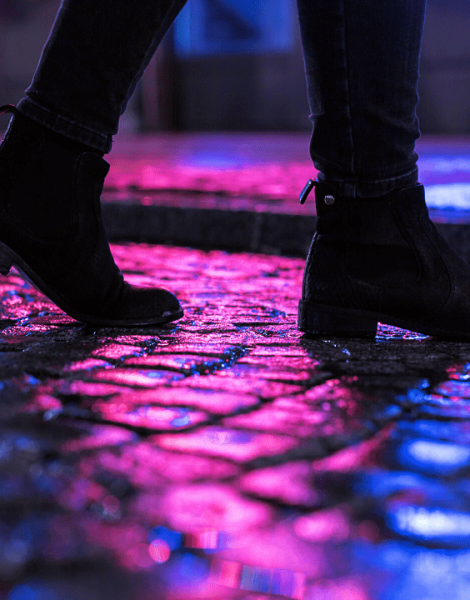It’s almost 11 p.m.
We’re waiting for her call.
Byron would like to go to sleep. Yet I would like him to be the one who responds to her. My legs are tired. I’m in my pajamas, a glass of wine on the side table.
When she calls or texts, she will tell us she’s home from the track meet, that the bus is in the high school parking lot. One of us will walk the three blocks to the school to retrieve her.
If I could drive over, I’d be more willing to be the parent on retrieving duty. There I’d sit in my old car, idling, burning gas, staying warm, hoping the buses pull in soon so I can grab my kid, smile internally while pointedly not talking to her, go to bed, and leap up again too few short hours later.
But when I joked a few months ago about driving the three blocks to get our daughter after a ski meet, my pure, principled, stand-up husband said, “That’s a slippery slope. We live really close to the school. We shouldn’t open the door on opting to drive over. There’s no reason we can’t walk.”
One of us comes from a family where members have gone years without eating meat, sugar, or caffeine.
I come from a family where we stood in the garage at the open deep freeze, holding a spoon, hovering over a box of ice cream, waiting for the edges to soften so we could dig out triangles from the corners.
Despite my corner-cutting upbringing, it is easy for me to agree with my husband’s sentiment that it’s best not to hop in the car just because we’re tired, and our day feels Done. I get exasperated with the American habit of driving a hundred yards, from the Best Buy to the Target, rather than walking. I am conscious of the limited resources and borrowed time we heedlessly gobble up, like they’re an Egg McMuffin with a side of French Toast Sticks. I am frustrated by people who complain about the price of gas and own remote starters for their cars.
Show me a tree. I will hug the bark off that sap-dripper.
So, okay. We won’t get into the habit of driving over for late-night pick-ups.
We’ll walk.
Blessedly, the walk is bliss.
Darkness. Cool air. Shadowy branches swaying gently overhead, their claws finger painting the sky.
The hush that reminds us everyone else is hunkered down inside, watching Fallon, making tomorrow’s lunches, reading three pages before the book hits the nose. To walk outside late at night feels delicious, nearly illicit.
Sometimes Byron and I flip a coin, draw straws, make a case, just to be the lucky one who gets to walk over. Those seven minutes are an unparalleled swing through an alternate universe, a private meditation broken only by arrival at the high school, that hulking building with lights ablaze, where the reek of diesel, the line of chugging parent pick-up cars, the heap of bags being offloaded from storage compartments–all yank the dreamy walker back to crisp, hard reality.
For me, whenever I reach the parking lot, I am buzzing with happiness. Usually, because it’s late at night, my hair is slightly damp from an earlier shower. Usually, because it’s cold or I’m worried I’ll be late, I trot my way from home to the school. Usually, I’m breathless.
And then I stand outside the buses, scanning their windows, trying to spot my girl.
I stand, waiting in darkness.
Somewhere inside the bus, she mills in the light.
Sleepy, soft, yawning, reminding me of toddlers waking from their afternoon naps, the teenagers adjust their ponytails, elbow their friends, bend down to pick up back-packs.
Inside the illuminated bus, the sprinters, pole vaulters, and hurdlers gather themselves, preparing to face the cold, to meet their parents’ questions, to remember unfinished homework, to make their way home and dive under the covers, only to leap up again too few short hours later.
There she is. My specific girl.
She won’t be talkative. Questions about how her race went will be deflected. Yes, she ran a personal record, shaving fifteen seconds of her previous best time. She’ll shuck off my enthusiasm. On her talented team, at her big school, a 6:28 mile is nothing. She was only put into the race because the juniors were taking the ACT that day. A 6:28 mile places her middle-to-back of the pack, forty seconds behind the front runners, the last of the four runners from her team, for sure.
Side by side, we’ll walk home, the shadowy branches swaying gently overhead, their claws finger painting the constellation of a runner darting across the sky. I’ll try not to monologue, lecture, effuse about how, in the larger scope of the world, her ability to run stands out as a gift. I’ll refrain from putting her performance into a larger, more meaningful, context. I’ll let us glide home on the quiet of the world.
I’ll let her figure out, deep in her hidden recesses, what today’s performance on the track means.
I’ll offer to carry her clarinet. I won’t ask if she read the assigned 112 pages of To Kill a Mockingbird.
None of this will not happen tonight, though.
My legs are tired. I’m in my pajamas, a glass of wine on the side table.
It’s Byron’s night.
When he reads her message, the one that notifies, “15 minutes,” he’s brushing his teeth. He comes in to say, “I’m heading out now,” and his eyes are bleary, tomorrow’s whiskers already sprouting.
Looking at his face, adjusting the fleece blanket draped across my lap, I offer, “I’m happy to go, you know. You need bed. I’ll get her.”
“No,” he assures me. “I want to go. I love the walk.”
This post originally appeared on O Mighty Crisis. It has been reprinted with permission.
Jocelyn Pihlaja has been teaching English at the college level since 1991. She has a husband who cooks dinner every night, kids who hold up hands requesting “Silence!” when their reading is interrupted, and a blog, O Mighty Crisis. When the world is too much with her, she retreats to books, trails, and gardens.








